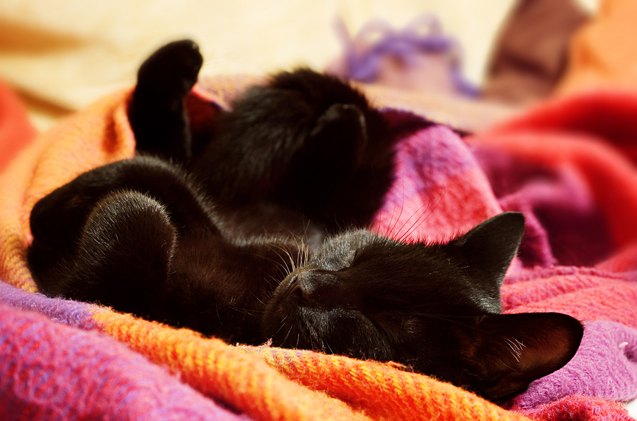How to Keep Your Cat Calm at Night

Felines can have nocturnal habits, using the dark to explore. But you need a good night’s sleep, which doesn’t include your cat’s midnight adventures.
Is your cat a lover of the night, to the point that he’s always making noise that keeps you awake in the wee hours? Then you probably feel frustrated and annoyed because of your furry friend’s antics, and you may not know what you can do to get him to operate on your sleep schedule.
Thankfully, there are steps you can take to help calm your kitty down at night so you can both get some rest and relaxation.
Schedule Mealtime and Playtime at the Right Time
In the same way that you can schedule your days and evenings to help ensure your kids will be able to go to the bed at the right time each night and get the necessary amount of sleep, you can take similar steps with your cat. By slightly changing the routine, you might be surprised by the results you can get when it comes to helping your cat sleep at the same time as you. So, it’s worth giving this a try, but just keep in mind that it might take a bit of trial and error to figure out what will work for you and your pet.
Related: Do Cats Dream of Chasing Mice and Balls of Yarn?
One way to prepare your kitty for bed is by properly scheduling his dinnertime and his evening playtime. Think of it this way: by helping your cat release energy in a positive way, and filling his belly with a delicious meal, he might naturally feel like going to sleep around the same time that you’re ready to go to bed. And this might even help your kitty sleep through most, if not all, of the night so you won’t end up getting woken up by his zoomies.
How does this work? Well, if you feed your pet right before you head off to bed, he’ll likely want to sleep with you because felines tend to rest after they consume a large meal. But if this doesn’t work and your cat continues to try to get you up in the middle of the night for more food, you can buy a timed feeder that will automatically dispense some food while you sleep. Just reduce other meal portions throughout the day so your kitty doesn’t gain too much weight.
In addition to resting after eating a big meal, cats tend to relax and take a nap after they’ve had a solid play session during which they let out their excess energy and fulfilled their predatory instincts. So, consider putting aside some time for fun interactive play sessions during the evening. Use toys that your cat likes to chase, pounce on, and claw at, and play with your cat until he gets tired. Also, have a variety of toys available so you can switch things up if your frisky feline ends up getting bored with the same toys and games each night. Keeping things fresh can even help mentally stimulate your cat, and that might be yet another way to get him to release his energy in ways that will help him get ready for a full night’s sleep.
Give Your Cat Ways to Stay Active and Occupied
Speaking of toys, keep in mind that you do have options if you want to be able to let your cat play on his own whenever you can’t make time to play with him. Of course, we recommend always doing your best to spend at least a few minutes playing with your furry friend because it’s a fantastic way to bond with your pet, but we know that, sometimes, that isn’t always possible.
Whether you’re too tired to play with your pet after a long day at work or you want to make sure that your cat has something to prevent boredom overnight, there are plenty of toys that you can leave around the house. Examples include balls and stuffed mice that your cat can find and play with, and there are also a variety of treat balls, puzzle games, and automated toys that can keep your cat playing even while you sleep so he doesn’t bother you.
These same types of toys can also make it easier for your cat to stay more active throughout the day so he’s more tired at night. If your cat is bored during the day and naps while you’re at work, he will be a lot more awake and ready for interaction and play when you get home.
Note: Just be sure that the products you leave out will be safe for your kitty to use when unsupervised.
Related: Why Do Cats Meow at Night?
Provide Environmental Enrichment
Enriching your cat’s environment may be beneficial when it comes to regulating his schedule. It can also help him feel happier and help him get much-needed exercise. Plus, when there are things for your kitty to do, especially when you aren’t home, he may not feel as lonely or bored.
The good news is there are loads of ways to enrich your pet’s environment. For instance, you can install window perches so your cat can look outside, play cat videos on TV while you aren’t home, and set up a cat tree for climbing.
Basically, if your kitty can feel safe and keep himself entertained, you might find that he spends the day awake and active, which means he might be ready to calm down and relax with you at night.
Consider Getting Your Cat a Companion
As mentioned above, a single cat who spends a lot of time alone when you aren’t home may become bored and lonely, and this could result in him wanting to interact with you throughout the evening and late into the night.
If you only have one kitty, consider getting him a companion that he can play with and interact with whenever you aren’t around, as well as while you sleep. This may even help if your cat doesn’t let you close the door to your bedroom at night. If he has a feline friend to snuggle with and share toys with, he won’t feel left out, so he might be less likely to meow behind your bedroom door.
Plus, when you have more than one cat, you can watch them interact with one another, nap together, and eat meals together, which is super cute—and you’ll get double the love and attention too.
Make Sure Your Cat is Healthy
It’s important to be aware of the fact that your cat might be trying to tell you something if he stays up all night, so don’t just dismiss this behavior as your kitty merely being annoying.
If you notice that your cat wanders restlessly throughout the house at night, and if he cries or meows a lot, he might actually have a medical condition that’s causing discomfort or pain. Therefore, it’s best to have your pet examined by a veterinarian to rule out any health problems.
Bottom line: once you know that your cat’s nighttime behavior isn’t related to a medical issue, simply enriching his environment and spending time with him before bed could help you both sleep through the night in peace.

Lisa Selvaggio is a freelance writer and editor, and our resident cats-pert, with certifications in pet nutrition and pet first aid. She enjoys producing content that helps people understand animals better so they can give their pets a safe and happy home.
More by Lisa Selvaggio























